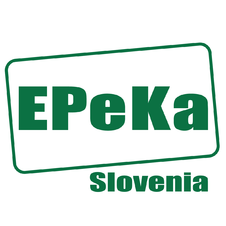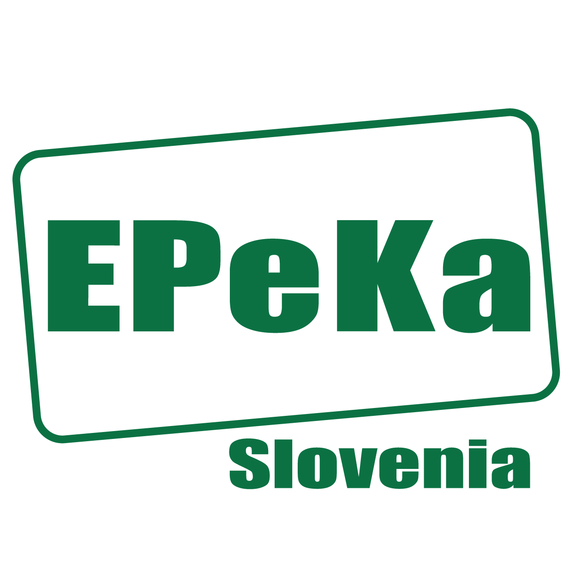Difference between revisions of "EPeKa Scientific and Research Association"
(gallery txt) |
|||
| Line 68: | Line 68: | ||
In 2014 a sister organisation of the EPeKa, the EPeKa Türkiye, was opened in Sinop, Turkey. | In 2014 a sister organisation of the EPeKa, the EPeKa Türkiye, was opened in Sinop, Turkey. | ||
| − | Roma youth and cultural centre Roma | + | Roma youth and cultural centre [[Roma Station]] was opened in 2017. Ever since it hosts many lectures, exhibitions as well as concerts and other performances. |
}} | }} | ||
| Line 96: | Line 96: | ||
==See also== | ==See also== | ||
| + | * [[Roma Station]] | ||
* [[Maribor, European Capital of Culture 2012]] | * [[Maribor, European Capital of Culture 2012]] | ||
Latest revision as of 01:11, 15 February 2020
-
to
28 Jun 2014
28 Jul 2014
-
to
3 Jun 2014
16 Nov 2014
Slovene comics showcased at the exhibition 100 years in the Balkans: The comic strip in resistance, coorganised by EPeKa Scientific and Research Association, Stripartnica Buch
-
2 Jun 2014
An exhibition of Slovene comics, organised by the EPeKa Scientific and Research Association and the Embassy of the Republic of Slovenia Brussels,
-
to
12 Apr 2013
8 May 2013
An exhibition of Slovene comic books coorganised by EPeKa Scientific and Research Association and Stripartnica Buch
Exhibitions
The premises of the association also offer a gallery space known as EPEKA Gallery. Works by Jernej Forbici (SLO), Bojana Radulovič (MNE), Marko Lipuš (SLO), and others have been on display there.
In 2013 a major exhibition, entitled Intergenerational Comics Exhibition – Together for a Better Living, was opened and hosted 50 adult and 50 young artists. The exhibition was a part of an international EU-funded project coordinated by Info Project from Romania involving 11 organisations from various countries (Cyprus, the Czech Republic, Hungary, Italy, Poland, Portugal, Slovenia, Spain, Sweden, and the United Kingdom).
In 2014 EPeKa was invited to co-curate 100 years in the Balkans – The comic strip in resistance with Stripforum from Zagreb, an exhibition conducted in partnership with Centre Belge de la Bande Dessinée and the Bosnian Cultural Center from Sarajevo and Stripartnica Buch. This most significant exhibition on comics from the region, which also features Slovene comics, is on display at the Belgian Comic Strip Center in Brussels. The exhibition features artists from former Yugoslavia: Macedonia, Bosnia and Herzegovina, Croatia and Slovenia (featuring artists KOstja Gatnik, Miki Muster, Tomaž Lavrič, Zoran Smiljanić, Iztok Sitar, Jelko Peternelj).
Nowdays, Epeka Gallery is mostly focused on exhibiting art produced by members of vulnerable groups, which is closely connected to their educational and entrepreneurial work targeting the Roma and other marginalised groups. Exhibitions related to relevant and sometimes problematic and controversial topics are often to be seen, which can be exhibit by foreign or local emerging artists.
Education
The association is also concerned with socially engaged education, especially when it comes to marginal social groups. In the past it has organised several workshops, lectures, and projects aimed at an inclusive approach for local and international protagonists (such as English lessons for Roma, intercultural dialogue, lessons of Romani language, etc.).
The education projects are closely related with the European Volunteer Service (EVS), an organisation with which EPeKa extensively collaborates. Among others sources, EPeKa is also financed through institutions that promote European mobility and education: the Centre of the Republic of Slovenia for Mobility and European Educational and Training Programmes (CMEPIUS), MOVIT – a Service for the Promotion of Youth Mobility, and the Slovene Human Resources Development and Scholarship Fund.
Social entrepreneurship
The most well-known EPeKa project is Romani kafenava, the first Roma restaurant in Slovenia, which opened its doors in 2014. The project was supported by the EU Social Fund and the Ministry of Labour, Family, Social Affairs and Equal Rights of the Republic of Slovenia.
Other projects include lectures and debates on social economy, the destigmatisation of vulnerable social groups, and other relevant themes.




